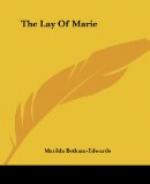the date of her interment he would never more exercise
the functions of a knight; but, after having erected
an abbey on the spot, sanctified by her remains, would
assume himself the monastic habit, and daily visit
her tomb to express his love, his grief, and his remorse.
He then, with difficulty tore himself from the body,
and departed; having first sent a messenger to his
castle to announce that he was arrived, but so much
fatigued and way-worn, as to require nothing but repose
and solitude. His wife met him with her usual
gentleness of affection; but instantly saw in his haggard
looks that his heart laboured with some misery which
her tenderness was unable to remove. His manners
were such as to awaken without satisfying her curiosity.
He rose at day break, spent some hours at prayers,
walked alone into the forest, proceeded instinctively
to the fatal hermitage, and returned late in the evening,
bearing with him, as it appeared, an additional load
of misery. He saw with astonishment that death
seemed to abstain from ravaging the beauties of Guilliadun;
he involuntarily gave way to the most flattering hopes;
and, after many long sad hours of tears and fruitless
prayer, retired in anguish and disappointment.
On the third day he gave notice he should go to court,
and pass the evening with the king. His wife,
in the mean time, by the promise of the most tempting
rewards, had engaged one of her pages to follow his
master at a distance, during his forest walk, and
report what he should see and hear; and the page,
having on that morning executed his commission, she
determined to take advantage of Eliduc’s absence
to visit the hermitage, and discover, if possible,
the cause of that excessive grief to which he gave
way; and of which the death of the old hermit, much
as he might have loved him, was far from affording
a satisfactory explanation. She set forth with
the page, entered the chapel, beheld, with much surprize,
a bed handsomely ornamented; and, on lifting up the
covering, saw, with still more astonishment, the young
and blooming Guilliadun, “qui resemblot rose
nuvele.” The faultless beauty of a living
rival might have excited some indignation in the bosom
of the most patient wife, but the eyes of the lovely
object before her, appeared closed for ever; and Guildeluec
could find no place in her heart, for any sentiments
but those of admiration and pity. After calling
her page to survey the spectacle which fully explained
and excused her husband’s immoderate grief,
she sat down by the bed to reflect on the past, and
decide on her own future conduct. During, the
long absence of Eliduc she had devoted the greater
part of her time to religious exercises, and now clearly
saw that to them only could she look for comfort.
Having convinced herself of this necessity, she turned,
with tears in her eyes, to the fair object of her
husband’s regret; when a circumstance, apparently
trifling, involuntarily arrested her attention.
A weasel, creeping from under the altar, ran upon




